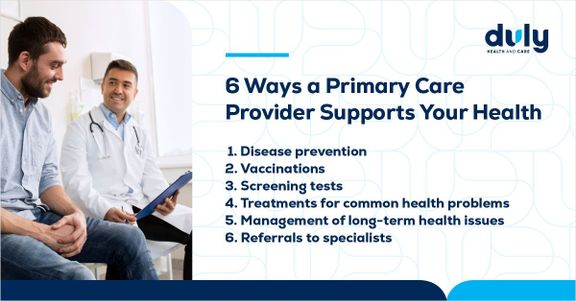Routine screenings. Flu symptoms. A referral to see a specialist. These are just a few of the many reasons you might make an appointment with your primary care provider (PCP).
Your PCP is a one-stop shop for most non-emergency medical situations. They treat common medical conditions, help you make healthy lifestyle choices, provide preventative care, and help direct you to another healthcare provider when necessary.

When choosing a PCP, you have options, including whether to see a family medicine or internal medicine provider for your care. Here’s an overview of each of these roles and how you can choose which one is best for you.
What’s the Difference Between a Family Medicine and an Internal Medicine Provider?
Both family medicine and internal medicine providers are great options for your primary care provider — but there are a few differences between the two.
Family medicine physicians provide primary care to patients of all ages, from infants to the elderly. This means they have the training to treat and care for a wide range of health conditions that you might encounter throughout your entire life.
Internal medicine physicians — also called internists — provide primary care for adult patients, and often specialize in ongoing care for chronic illnesses (like heart disease or diabetes) and caring for patients with more than one disease. They also focus on disease prevention.
Searching for a primary care provider? Make an appointment with a Duly internal medicine provider or family medicine provider today.
Family Medicine and Internal Medicine Training
While both family medicine and internal medicine providers are equipped to care for adult patients, there are some differences in their training.
Family Medicine Physicians
Family medicine physicians train in providing care for a continuum of patients from infant to adult. They focus on acute (severe and sudden) and chronic (ongoing) conditions as well as general wellness.
Family medicine providers also train in other departments, such as obstetrics, gynecology, surgery, geriatric care, and musculoskeletal medicine. They also gain experience in wellness areas, like behavioral health and population health.
Internal Medicine Physicians
Internal medicine physicians are typically only trained in treating adults (unless they undergo dual training in internal medicine and pediatrics). They study general medical issues as well as subspecialties, like endocrinology, rheumatology, and neurology.
Training for internal medicine also includes experience in other departments, like psychiatry, dermatology, sleep medicine, and geriatrics. This helps them gain a better understanding of other fields that they might refer patients to.
How Do I Know Which Is Right for Me?
Family medicine and internal medicine physicians are both capable of providing excellent care, including helping you live a healthy lifestyle, detecting health problems early, and diagnosing and treating illnesses. Still, you’ll need to decide which provider is best for you.
Family medicine providers take a broad approach in terms of health conditions as well as age. This prepares them to deal with a wide range of medical conditions, making them helpful for communities where certain specialists aren’t an option.
Because family medicine providers work with all ages, they tend to adapt their approach to meet the needs of their communities. They can also treat your whole family to gain a broader understanding of your medical history. Plus, you may not have to make the transition from pediatrics to an adult primary care provider.
Internal medicine providers, on the other hand, focus only on adults, making their training in adult medical concerns extensive. They are skilled at diagnosing diseases that impact adults and managing complex medical situations if you have multiple health conditions.
Because of their training in medical subspecialties, internal medicine providers are also well-equipped to work with colleagues in other specialties. This makes them ideal for patients with complex medical needs, such as heart conditions or autoimmune diseases.
Making the Best Decision for Your Health Needs
Choosing a primary care physician is an important decision. Ideally, you’ll stay with this provider long-term so they can gain a deeper understanding of your health. This makes it essential to choose the type of provider that aligns best with your needs and values.
While family medicine and internal medicine providers have slightly different training and approaches to care, they both put your health front-and-center. With either choice, you can rest assured that your primary care provider will help you live a long and healthy life.
Health Topics:








